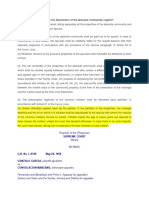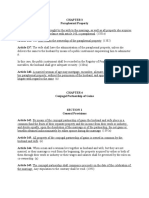0 ratings0% found this document useful (0 votes)
43 viewsSeparation
The document discusses judicial separation of property between spouses in the Philippines. It states that separation of property during marriage can only occur through a court order, and outlines situations that constitute sufficient cause for a court to order separation, such as abandonment or abuse. These include if one spouse has been sentenced to a penalty involving civil interdiction or declared absent. The document also discusses the process for voluntary dissolution of absolute community or conjugal partnership of gains, including notifying creditors. It notes the property will be liquidated after separation is decreed and that the absolute community or partnership remains responsible for family support during proceedings.
Uploaded by
Ali BCopyright
© © All Rights Reserved
Available Formats
Download as DOC, PDF, TXT or read online on Scribd
0 ratings0% found this document useful (0 votes)
43 viewsSeparation
The document discusses judicial separation of property between spouses in the Philippines. It states that separation of property during marriage can only occur through a court order, and outlines situations that constitute sufficient cause for a court to order separation, such as abandonment or abuse. These include if one spouse has been sentenced to a penalty involving civil interdiction or declared absent. The document also discusses the process for voluntary dissolution of absolute community or conjugal partnership of gains, including notifying creditors. It notes the property will be liquidated after separation is decreed and that the absolute community or partnership remains responsible for family support during proceedings.
Uploaded by
Ali BCopyright
© © All Rights Reserved
Available Formats
Download as DOC, PDF, TXT or read online on Scribd
You are on page 1/ 2
Article 134
In the absence of an express declaration in the marriage
settlements, the separation of property between spouses
during the marriage shall not take place except by judicial
order. Such judicial separation of property may either be
voluntary or for sufficient cause. (190a)
Article 135
Any of the following shall be considered sufficient cause for
judicial separation of property:
. That the spouse of the petitioner has been sentenced to a
penalty which carries with it civil interdiction;
. That the spouse of the petitioner has been judicially
declared an absentee;
. That loss of parental authority of the spouse of petitioner
has been decreed by the court;
. That the spouse of the petitioner has abandoned the latter
or failed to comply with his or her obligations to the
family as provided for in Article 101;
. That the spouse granted the power of administration in the
marriage settlements has abused that power; and
. That at the time of the petition, the spouses have been
separated in fact for at least one year and reconciliation
is highly improbable.
In the cases provided for in Numbers (1), (2) and (3), the
presentation of the final judgment against the guilty or
absent spouse shall be enough basis for the grant of the
decree of judicial separation of property. (191a)
Article 136
The spouses may jointly file a verified petition with the
court for the voluntary dissolution of the absolute
community or the conjugal partnership of gains, and for
the separation of their common properties.
All creditors of the absolute community or of the conjugal
partnership of gains, as well as the personal creditors of
the spouse, shall be listed in the petition and notified of
the filing thereof. The court shall take measures to protect
the creditors and other persons with pecuniary interest.
(191a)
Article 137
Once the separation of property has been decreed, the
absolute community or the conjugal partnership of gains
shall be liquidated in conformity with this Code.
During the pendency of the proceedings for separation of
property, the absolute community or the conjugal
partnership shall pay for the support of the spouses and
their children. (192a)
Article 138
After dissolution of the absolute community or of the
conjugal partnership, the provisions on complete
separation of property shall apply. (191a)
Article 139
The petition for separation of property and the final
judgment granting the same shall be recorded in the
proper local civil registries and registries of property.
(193a)
Article 140
The separation of property shall not prejudice the rights
previously acquired by creditors. (194a)
You might also like
- Bar Review Companion: Civil Law: Anvil Law Books Series, #1From EverandBar Review Companion: Civil Law: Anvil Law Books Series, #1No ratings yet
- 18-O-1480 - Exhibit 3 - DDA - Gulch (EZ Bonds) - Draw-Down Bond Purchase AgreementNo ratings yet18-O-1480 - Exhibit 3 - DDA - Gulch (EZ Bonds) - Draw-Down Bond Purchase Agreement32 pages
- Chapter_5_Property_Relation_between_husband_and_wifeNo ratings yetChapter_5_Property_Relation_between_husband_and_wife5 pages
- Tax004 Properties of Husband and Wife (1)No ratings yetTax004 Properties of Husband and Wife (1)21 pages
- Executive No. 209 Family Code of The Philippines: Article 129-138No ratings yetExecutive No. 209 Family Code of The Philippines: Article 129-13826 pages
- (LMGSTRP) Property Relations Pertinent LawsNo ratings yet(LMGSTRP) Property Relations Pertinent Laws12 pages
- Absolute Community Conjugal Partnership of Gains Complete Separation of PropertyNo ratings yetAbsolute Community Conjugal Partnership of Gains Complete Separation of Property14 pages
- Requirement of Dissolution of Property RegimeNo ratings yetRequirement of Dissolution of Property Regime7 pages
- I. Family Code Marriage Chapter 1. Requisites of MarriageNo ratings yetI. Family Code Marriage Chapter 1. Requisites of Marriage14 pages
- Chapter 3. System of Absolute Community Section 1. General Provisions Section 2. What Constitutes Community PropertyNo ratings yetChapter 3. System of Absolute Community Section 1. General Provisions Section 2. What Constitutes Community Property6 pages
- Absolute Community of Property (Termination and Dissolution Procedure)No ratings yetAbsolute Community of Property (Termination and Dissolution Procedure)3 pages
- Additional Codal For Finals in SuccessionNo ratings yetAdditional Codal For Finals in Succession4 pages
- Primer On Absolute Community of PropertyNo ratings yetPrimer On Absolute Community of Property3 pages
- Separation of Property of the Spouses and Administration of Common Property by One Spouse during the MarriageNo ratings yetSeparation of Property of the Spouses and Administration of Common Property by One Spouse during the Marriage3 pages
- July 8, 2015 G.R. No. 195166 Spouses Salvador Abella and Alma Abella, Petitioners, Spouses Romeo Abella and Annie Abella, RespondentsNo ratings yetJuly 8, 2015 G.R. No. 195166 Spouses Salvador Abella and Alma Abella, Petitioners, Spouses Romeo Abella and Annie Abella, Respondents17 pages
- Linger Linger Linger Linger Linger Linger: Inspired By: Inspired By: Inspired By: Inspired By: Inspired By: Inspired byNo ratings yetLinger Linger Linger Linger Linger Linger: Inspired By: Inspired By: Inspired By: Inspired By: Inspired By: Inspired by1 page
- Subject To The Final and Official Computation To Be Done by The Office of The Clerk of Court (OCC), The InitialNo ratings yetSubject To The Final and Official Computation To Be Done by The Office of The Clerk of Court (OCC), The Initial1 page
- Second Division: (G.R. No. 131175. August 28, 2001)No ratings yetSecond Division: (G.R. No. 131175. August 28, 2001)10 pages
- A. Therapeutic Communication Technique. Difinition ExampleNo ratings yetA. Therapeutic Communication Technique. Difinition Example5 pages
- The Originals The Resurrection - Julie PlecNo ratings yetThe Originals The Resurrection - Julie Plec183 pages
- Beyond the Mountain 1st Edition B. Camminga - The ebook in PDF and DOCX formats is ready for download now100% (2)Beyond the Mountain 1st Edition B. Camminga - The ebook in PDF and DOCX formats is ready for download now47 pages
- The Casualties in The Caraga Region. (2 PTS)No ratings yetThe Casualties in The Caraga Region. (2 PTS)2 pages
- Chapter 1: Decision Making and The Role of Accounting: Discussion QuestionsNo ratings yetChapter 1: Decision Making and The Role of Accounting: Discussion Questions8 pages
- Pengaruh Aset Pajak Tangguhan Dan Beban Pajak Tangguhan Pada Manajemen LabaNo ratings yetPengaruh Aset Pajak Tangguhan Dan Beban Pajak Tangguhan Pada Manajemen Laba3 pages
- The Icon in The Life of The Church - George Galavaris100% (2)The Icon in The Life of The Church - George Galavaris109 pages
- 004 - Fiduciarie State For Morocco ForbesNo ratings yet004 - Fiduciarie State For Morocco Forbes5 pages
- Empathy Research: What Do They Think & FeelNo ratings yetEmpathy Research: What Do They Think & Feel3 pages
- Noel v. The Boeing Co., 622 F.3d 266, 3rd Cir. (2010)No ratings yetNoel v. The Boeing Co., 622 F.3d 266, 3rd Cir. (2010)18 pages
- 2023 Global Construction Costs Database - Sample100% (1)2023 Global Construction Costs Database - Sample21 pages









































































































